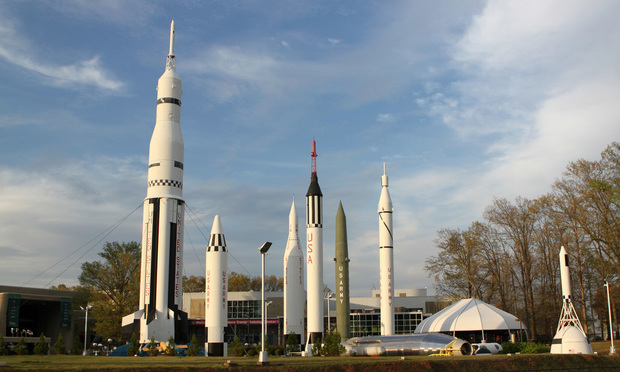Companies Entering Law's Final Frontier Find Nebulous Rules Around Commerce in Space
"Right now, because there are no clear regulations on these activities, companies are afraid," noted the head of one law school's space law center.
January 22, 2018 at 02:45 PM
5 minute read
 United States Space & Rocket Center. Photo: Ke4roh via Wikimedia Commons.
United States Space & Rocket Center. Photo: Ke4roh via Wikimedia Commons. A vacation to the Moon may no longer be a far-off pipe dream for Americans (at least those with plenty of money in the bank). Elon Musk's Space Exploration Technologies Corp., known as SpaceX, has previously announced plans to prepare to send private citizens into space by late 2018. And citizens of Earth—including the legal community—are wondering what comes next.
This is because, at the moment, it's not completely clear which commercial laws govern space or what regulations companies and their in-house attorneys have to follow there. Most of the space law that does exist deals with government and military activities, not commercial activity. And the laws that do address businesses in space mostly deal with satellites, not full-fledged space tourism or, say, asteroid mining.
“We have international and domestic laws geared up to the activities done in the last 40 years which [have been in] civil and military space,” said Sagi Kfir, the general counsel of Deep Space Industries, an asteroid mining company. “But with the boom of these startups we'll see an increased development or increased emphasis on developing new regulations for space.”
Before commercial activity in space gains traction as part of the U.S. economy, investors and space-focused companies need legislative clarity, says Mark Sundahl, director of Cleveland-Marshall College of Law's Global Space Law Center. With the current lack of clear legislation and regulatory guidance, he explained, there's fear that investments in space companies could be for naught if later legal changes leave vessels or business plans failing to meet newly established standards.
There are two bills before Congress to modify the space licensing laws for commercial use that are slated to have effects on the corporate universe.
One is the American Space Renaissance Act, which pushes for clearer regulation and more funding for regulators to minimize the risk for those who invest in commercialized space projects. The other, the American Space Commerce Free Enterprise Act, would create a single authority for U.S. authorization and supervision of nongovernmental space activities—right now it's unclear if some projects fall under the purview of the Federal Communications Commission or the National Oceanic and Atmospheric Administration—as well as a transparent certification process for commercial space ventures.
“Congress is actively pursuing new [space] regulations and the companies have got to be involved,” Sundahl said. “But to be GC of a company is a busy, busy thing, and they may neglect getting involved in the regulatory process. That's a big mistake because then they're going to end up with legislation they don't like.”
And it's not just pushing for regulation on a domestic level. While several companies interested in space have begun lobbying in D.C., according to federal database searches, there's also a lot of room for discussions about this area of law on the international stage.
Cold War-era legal frameworks such as the 1967 Outer Space Treaty still provide the main outlines for international space laws. And last year, Luxembourg joined the United States as one of the first countries to permit companies to claim ownership over items collected in space. Kfir notes there have been conversations in the United Arab Emirates, Japan, China and other countries about authorization and jurisdiction in space.
Some European countries are approaching space regulation discussions on a vessel-by-vessel basis, with ongoing debates as to which types of vessels should be covered under existing aerospace laws or less-specific (or non-existent) outer space laws in their jurisdiction. Whether a vessel is an aircraft or spacecraft, or both, can affect a company and country's liability.
According to Frans von der Dunk, a space law professor at the University of Nebraska-Lincoln, College of Law, the 1967 Outer Space Treaty, the 1972 Liability Convention and the International Telecommunication Union hold the United States as a state responsible and liable for what private actors from the country do in space.
“Consequently, the Commercial Space Launch Act ensures that anything launched into outer space for which the U.S. can be held responsible and liable will be properly licensed, including handling the derogation of international liability claims to be potentially paid by the U.S. government to the licensee and attendant insurance obligations,” von der Dunk wrote in an email to Corporate Counsel. “As of 2004 amendments, this also includes impending private manned spaceflight—'space travel.'”
On a company-specific level, U.S.-based operations sending private citizens to space won't be liable for private passenger injuries in space, according to von der Dunk, if they require passengers to sign a liability waiver to ride the space craft. But in other countries, it's not yet clear what a company's liability will be if passengers are harmed in-flight—another reason space-company GCs may focus on getting clear regulations.
“The most important point is that companies are asking for this regulation,” Sundahl said. “It's not really so much what the regulation is but that there is regulatory clarity. Right now, because there are no clear regulations on these activities, companies are afraid.”
This content has been archived. It is available through our partners, LexisNexis® and Bloomberg Law.
To view this content, please continue to their sites.
Not a Lexis Subscriber?
Subscribe Now
Not a Bloomberg Law Subscriber?
Subscribe Now
NOT FOR REPRINT
© 2025 ALM Global, LLC, All Rights Reserved. Request academic re-use from www.copyright.com. All other uses, submit a request to [email protected]. For more information visit Asset & Logo Licensing.
You Might Like
View All
Exits Leave American Airlines, SiriusXM, Spotify Searching for New Legal Chiefs
2 minute read


After Botched Landing of United Airlines Boeing 767, Unlikely Plaintiff Sues Carrier
5 minute readTrending Stories
- 1Uber Files RICO Suit Against Plaintiff-Side Firms Alleging Fraudulent Injury Claims
- 2The Law Firm Disrupted: Scrutinizing the Elephant More Than the Mouse
- 3Inherent Diminished Value Damages Unavailable to 3rd-Party Claimants, Court Says
- 4Pa. Defense Firm Sued by Client Over Ex-Eagles Player's $43.5M Med Mal Win
- 5Losses Mount at Morris Manning, but Departing Ex-Chair Stays Bullish About His Old Firm's Future
Who Got The Work
J. Brugh Lower of Gibbons has entered an appearance for industrial equipment supplier Devco Corporation in a pending trademark infringement lawsuit. The suit, accusing the defendant of selling knock-off Graco products, was filed Dec. 18 in New Jersey District Court by Rivkin Radler on behalf of Graco Inc. and Graco Minnesota. The case, assigned to U.S. District Judge Zahid N. Quraishi, is 3:24-cv-11294, Graco Inc. et al v. Devco Corporation.
Who Got The Work
Rebecca Maller-Stein and Kent A. Yalowitz of Arnold & Porter Kaye Scholer have entered their appearances for Hanaco Venture Capital and its executives, Lior Prosor and David Frankel, in a pending securities lawsuit. The action, filed on Dec. 24 in New York Southern District Court by Zell, Aron & Co. on behalf of Goldeneye Advisors, accuses the defendants of negligently and fraudulently managing the plaintiff's $1 million investment. The case, assigned to U.S. District Judge Vernon S. Broderick, is 1:24-cv-09918, Goldeneye Advisors, LLC v. Hanaco Venture Capital, Ltd. et al.
Who Got The Work
Attorneys from A&O Shearman has stepped in as defense counsel for Toronto-Dominion Bank and other defendants in a pending securities class action. The suit, filed Dec. 11 in New York Southern District Court by Bleichmar Fonti & Auld, accuses the defendants of concealing the bank's 'pervasive' deficiencies in regards to its compliance with the Bank Secrecy Act and the quality of its anti-money laundering controls. The case, assigned to U.S. District Judge Arun Subramanian, is 1:24-cv-09445, Gonzalez v. The Toronto-Dominion Bank et al.
Who Got The Work
Crown Castle International, a Pennsylvania company providing shared communications infrastructure, has turned to Luke D. Wolf of Gordon Rees Scully Mansukhani to fend off a pending breach-of-contract lawsuit. The court action, filed Nov. 25 in Michigan Eastern District Court by Hooper Hathaway PC on behalf of The Town Residences LLC, accuses Crown Castle of failing to transfer approximately $30,000 in utility payments from T-Mobile in breach of a roof-top lease and assignment agreement. The case, assigned to U.S. District Judge Susan K. Declercq, is 2:24-cv-13131, The Town Residences LLC v. T-Mobile US, Inc. et al.
Who Got The Work
Wilfred P. Coronato and Daniel M. Schwartz of McCarter & English have stepped in as defense counsel to Electrolux Home Products Inc. in a pending product liability lawsuit. The court action, filed Nov. 26 in New York Eastern District Court by Poulos Lopiccolo PC and Nagel Rice LLP on behalf of David Stern, alleges that the defendant's refrigerators’ drawers and shelving repeatedly break and fall apart within months after purchase. The case, assigned to U.S. District Judge Joan M. Azrack, is 2:24-cv-08204, Stern v. Electrolux Home Products, Inc.
Featured Firms
Law Offices of Gary Martin Hays & Associates, P.C.
(470) 294-1674
Law Offices of Mark E. Salomone
(857) 444-6468
Smith & Hassler
(713) 739-1250






